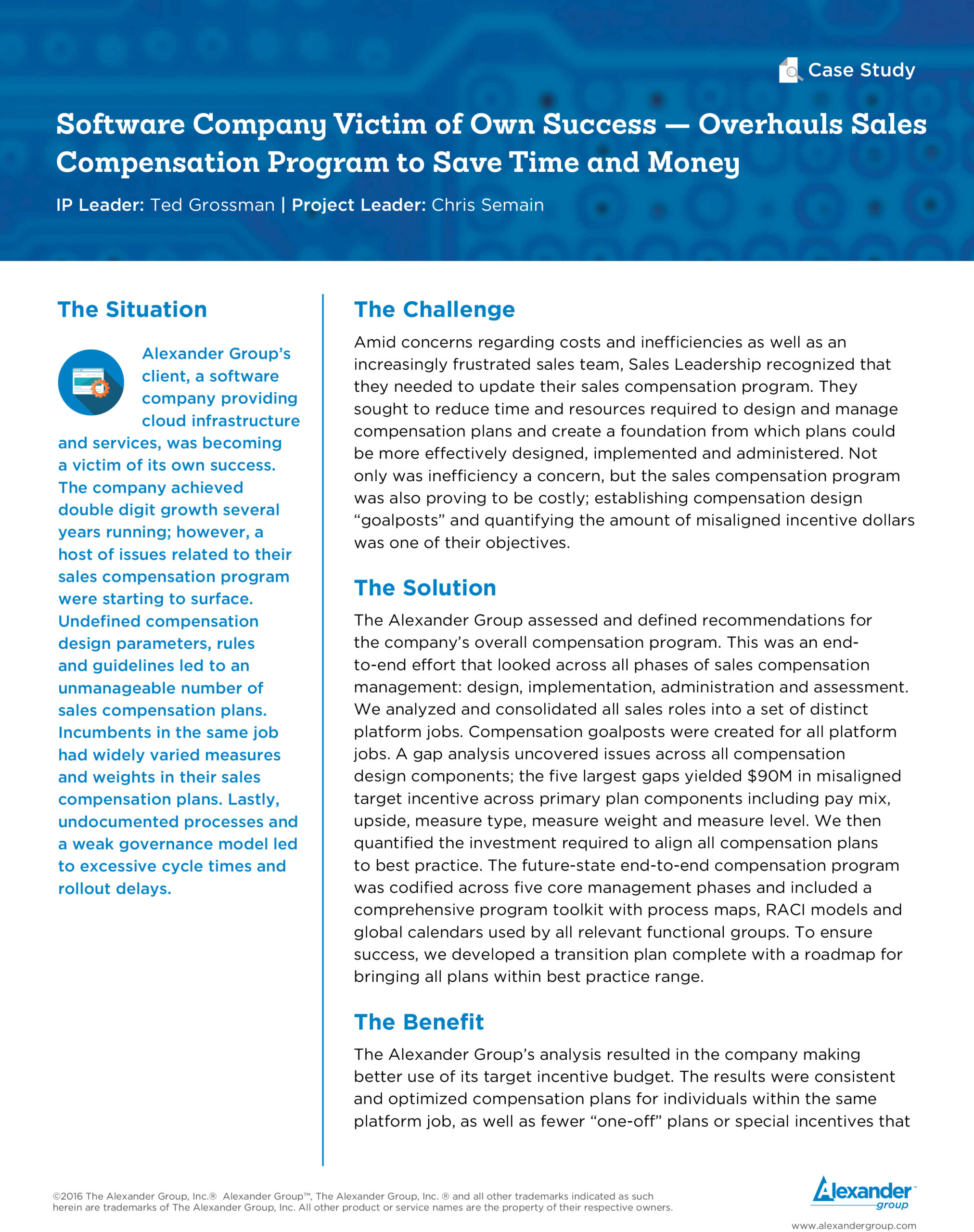Software Company Victim of Own Success: Overhauls Sales Comp Program
 Situation: Alexander Group’s client, a software company providing cloud infrastructure and services, was becoming a victim of its own success. The company achieved double digit growth several years running; however, a host of issues related to their sales compensation program were starting to surface. Undefined compensation design parameters, rules and guidelines led to an unmanageable number of sales compensation plans. Incumbents in the same job had widely varied measures and weights in their sales compensation plans. Lastly, undocumented processes and a weak governance model led to excessive cycle times and roll-out delays.
Situation: Alexander Group’s client, a software company providing cloud infrastructure and services, was becoming a victim of its own success. The company achieved double digit growth several years running; however, a host of issues related to their sales compensation program were starting to surface. Undefined compensation design parameters, rules and guidelines led to an unmanageable number of sales compensation plans. Incumbents in the same job had widely varied measures and weights in their sales compensation plans. Lastly, undocumented processes and a weak governance model led to excessive cycle times and roll-out delays.
Challenge: Amid concerns regarding costs and inefficiencies as well as an increasingly frustrated sales team, Sales leadership recognized that they needed to update their sales compensation program. They sought to reduce time and resources required to design and manage compensation plans and create a foundation from which plans could be more effectively designed, implemented and administered. Not only was inefficiency a concern, but the sales compensation program was also proving to be costly; establishing compensation design “goalposts” and quantifying the amount of misaligned incentive dollars was one of their objectives.
Solution: The Alexander Group assessed and defined recommendations for the company’s overall compensation program. This was an end-to-end effort that looked across all phases of sales compensation management: design, implementation, administration and assessment. We analyzed and consolidated all sales roles into a set of distinct platform jobs. Compensation goalposts were created for all platform jobs. A gap analysis uncovered issues across all compensation design components; the five largest gaps yielded $90M in misaligned target incentive across primary plan components including pay mix, upside, measure type, measure weight and measure level. We then quantified the investment required to align all compensation plans to best practice. The future-state end-to-end compensation program was codified across five core management phases and included a comprehensive program toolkit with process maps, RACI models and global calendars used by all relevant functional groups. To ensure success, we developed a transition plan complete with a roadmap for bringing all plans within best practice range.
Benefit: The Alexander Group’s analysis resulted in the company making better use of its target incentive budget. The results were consistent and optimized compensation plans for individuals within the same platform job, as well as fewer “one-off” plans or special incentives that minimized plan dilution and performance distortion. The new process and governance model provided much needed accountability, with less confusion. All stakeholders now had clear ownership and deadlines for completing core activities within known timelines. In addition, the company significantly reduced the risk of a single point of failure; the process would still run smoothly even if a key player left the company. As a result of this initiative, the team was able to reduce the time required to perform all compensation management activities, freeing up time to be reallocated towards other, high-value rep enablement activities.
Download a PDF of this Case Study »
Learn more about AGI’s Sales Compensation Program Management practice.